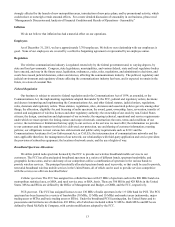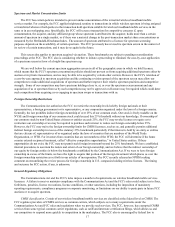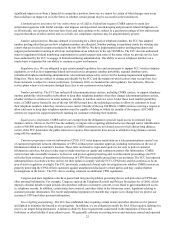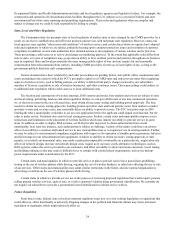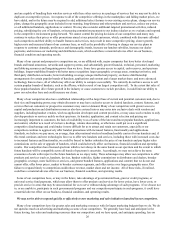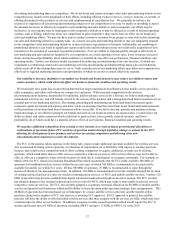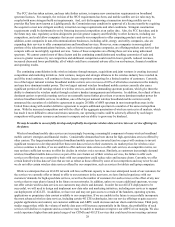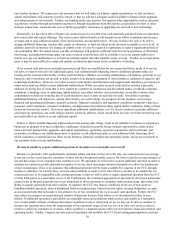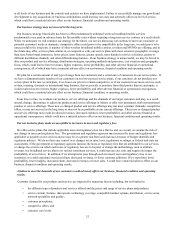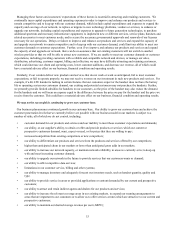Metro PCS 2011 Annual Report Download - page 34
Download and view the complete annual report
Please find page 34 of the 2011 Metro PCS annual report below. You can navigate through the pages in the report by either clicking on the pages listed below, or by using the keyword search tool below to find specific information within the annual report.23
by others and do not have the right to paint or control the lighting at the site but, as an FCC-licensed carrier at the site, still
could be held accountable if the lighting and painting requirements are not met.
Radio frequency limits. The FCC sets limits on radio frequency, or RF, emissions from cell sites and has rules that
establish procedures intended to protect persons from RF hazards. We have policies in place designed to comply with the
applicable limits and restrictions at cell sites where we have operations, but, given the number of sites involved and the nature
of the requirements, we cannot guarantee that we are in compliance at each cell site at all times.
Emergency warning. The FCC has adopted technical standards, protocols, procedures, and other requirements under the
Warning, Alert, and Response Network Act, or WARN Act, to govern emergency alerting standards for CMRS providers which
voluntarily elect to participate. Rules, regulations and industry protocols are in the process of being developed to implement
this program. We have elected to participate in the voluntary emergency alert program, although we could alter our election at a
future date. Under the adopted rules, a participating carrier must notify customers of the availability of emergency alerts but
may not charge separately for the alerting capability and the CMRS carrier's liability related to, or any harm resulting from, the
transmission of, or failure to transmit, an emergency alert is limited. The FCC also is considering the feasibility of requiring
wireless providers to distribute emergency information and, if it does so, the requirements to which we are subject under the
rules and the WARN Act may change.
White spaces. The FCC has adopted rules to allow unlicensed radio transmitters to operate in the unused broadcast digital
television spectrum, or White Spaces. The FCC's rules provide for both fixed and personal/portable devices to operate in the
White Spaces on an unlicensed basis, subject to various protections to existing users of the spectrum. Policies and industry
protocols are in the process of being developed to implement this program. Other companies may offer services in the White
Spaces that compete with services offered by us.
Regulatory classifications. In January 2008, the FCC solicited comments on whether text messages and short codes are
common carrier services to which CMRS carriers must provide non-discriminatory access. The outcome and such timing of any
FCC action, or the effect that such a ruling would have on us, is presently unknown. In 2011, the FCC sought comment on a
petition by the Universal Service Fund Administration requesting that the FCC provide guidance as to whether short message
services revenues are to be included in a carrier's interstate revenues for the purpose of calculating USF contributions.
Outage reporting. The FCC requires all telecommunications carriers to report outages meeting certain specified criteria to
the FCC. These reporting requirements affect the way we track and gather data regarding system outages and repair outages.
Outage reporting is subject to active regulatory oversight, and we are potentially subject to fines and forfeitures if we fail to
make timely reports. The FCC recently extended these outage reporting rules to voice over internet protocol, or VoIP, service
providers.
Customer Complaints. The FCC has established a process by which customers of wireless service providers can
informally and formally complain about a provider's service. These rules require the wireless service provider to respond to
such complaints within a specified period of time. A failure to respond to any complaints can lead to fines, forfeitures or other
penalties.
Other Federal Regulation
Copyright protection. The Digital Millennium Copyright Act, or DMCA, protects against the circumvention of
technological measures employed to protect copyrighted works, or access control. Under the DMCA, the Copyright Office of
the Library of Congress, or the Copyright Office, has the authority to exempt certain activities which otherwise might be
prohibited by that the DMCA for a period of three years, subject to possible extension for successive three year periods. In
2006, the Copyright Office granted an exemption pertaining to the unlocking of wireless phones which facilitated moving
handsets from one carrier service to another. The exemption was extended in 2010, in a slightly modified form. The current
exemption allows circumvention of certain software locks and other firmware on wireless telephone handsets when such
circumvention is solely to enable authorized connection to a wireless telecommunications network. The Copyright Office
recently initiated a proceeding to determine what exemptions will be in effect for the next three year period. We have
implemented a service called MetroFlash that enables new customers under certain circumstances to unlock and reprogram
their existing CDMA handsets so that they will operate on our networks. The MetroFlash program has been designed to meet
the current exemption, but the scope of the new exemption remains untested.
Other. Our operations also are subject to various other federal laws and regulations, including antitrust, privacy, unfair
competition, consumer, environmental, labor, wage, health and safety, personal information laws and regulations promulgated
by the Federal Trade Commission, the Federal Aviation Administration, the Environmental Protection Agency, the


